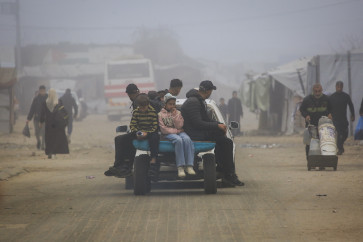Popular Reads
Top Results
Can't find what you're looking for?
View all search resultsPopular Reads
Top Results
Can't find what you're looking for?
View all search resultsEditorial: Not-so-clean government
The whopping Rp 36 billion (US$3
Change text size
Gift Premium Articles
to Anyone
T
he whopping Rp 36 billion (US$3.9 million) in donations that have gone into the coffers of Supreme Audit Agency (BPK) chief Hadi Poernomo during his career as a tax officer has raised many eyebrows.
Not only Indonesia Corruption Watch (ICW), but ordinary people with any common sense will be tempted to question his claim that he raised such a huge fortune from his extremely generous parents, siblings and relatives. Hadi, a former tax office chief, amassed Rp 12 billion in the last four years, which he said was mostly from donations.
Donations have become a regular explanation, if not excuse, for a steep increase in public officials’ assets since wealth declaration was made mandatory for the country’s state officials in 1999. The mandatory wealth report was introduced as the country embarked on a fight against corruption, with a hope the Corruption Eradication Commission (KPK) and the public alike could verify the assets of state officials from the executive, legislative and judiciary branches of power.
That the public control mechanism hardly works may explain that awareness of corruption eradication has been limited to the educated community, but the bulk of the population has remained silent. Or perhaps Indonesian people are culturally so permissive to corrupt practice that it may take the nation one or two generations to uproot graft.
Public participation is key to the nationwide drive against corruption through a simple action called a reality check, which has worked well in the neighboring Philippines, where corruption is as deeply rooted as in Indonesia. Through a reality check, the public may question how a new young tax officer could buy a luxury apartment or middle-ranking police and military officers possess luxury cars and send their children to study overseas.
There are so many blatant facts of the glamorous lifestyle of our state officials and their families around us that should provoke the basic question needed to kick-start a probe into alleged corruption: where has the money come from?
Public announcements of the wealth of state officials are a good start. But little has been heard about the KPK’s efforts to verify the wealth reports. Wealth reports have been reduced to a ceremony to show public officials’ compliance with the law, regardless of their questionable assets.
Tougher regulations are needed to make sure accountable wealth reports, including penalties for public officials who falsify their wealth reports. In the long run, the nation may need to consider shifting the burden of proof to the state officials. It may spark a lengthy debate, as the country’s legal system does not recognize the mechanism, but for the sake of a clean government and good governance such a revolutionary legal reform is worth exploring.










